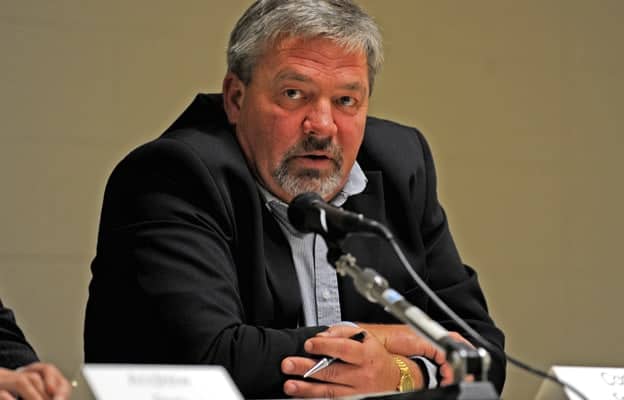With accusations of robo-calling, bitter debates, and candidates with criminal records, the race for regional chair has been hotly contested. And it may be the most competitive since incumbent Ken Seiling took the job 29 years ago.

The ballot will feature Seiling, Jay Aissa, Robert Milligan, Paul Myles, Moira-Sharon Magee, Oscar Cole-Arnal and Jonathan Wolf.
And much of the discussion has revolved around the region’s debt and the related light rail transit project.
“In 2009, our regional debt was $185 million,” Aissa told The Observer in an e-mail. “By the end of 2014, our projected Regional debt will reach $548 million. Our regional debt will have tripled in five years. Tripling our debt within five years is not something to be proud of. And how do governments pay off debt? Of course, they raise your taxes.”

Aissa, a vocal opponent of the LRT, owns and operates Jay Fencing. He has pledged to work at cancelling the project.
“The region’s capital plan to 2023 is calling for projects that will cost an additional $2.6 billion, and if all goes according to plan, we will have to borrow another $1.1 billion to fund future projects,” Aissa said. “Add that to the $548 million debt at the end of 2014 and you will find that the Region of Waterloo will be over $1.6 billion in debt by the end of 2023. This is unacceptable.”

And that debt will have major implications for the townships, he added.
“With regard to the townships, the most important issue that must be addressed is the cutback in capital projects being experienced by the townships, and the gradual withdrawal of services. If things continue as they are, the townships will receive less and less as the debt climbs.”
Seiling on the other hand, explained the rationale behind LRT.
“For me, the defining issue (of this election) is how we manage the growth we are experiencing in this very successful region,” he said. “Our plan to protect farmland and environmentally sensitive lands and water supply is rooted on intensifying growth in the urban areas by using rapid transit as the means to do so. This is borne out in so many other communities around the world who have used transit to shape their growth.”

LRT will also reduce pollution and cut down on traffic gridlock, the Elmira resident added.
Cole-Arnal says poverty is his main focus.
“In spite of media hype and in spite of the alternatives offered by Mr. Sieling’s upscale boosterism view of growth and in spite of Mr. Aissa’s austerity program of tax cuts and cancelling the LRT, my/our (Alliance Against Poverty, AAP) campaign centers on the obscene wealth gap of our society (from globally to locally), the concern of well over 50 per cent of our population,” the former pastor and university professor told The Observer. “Indeed the issues surrounding the LRT are symptoms of this larger issue.”
Jonathan Wolf on the other hand, highlighted climate change as a priority in a statement to The Observer.
“I believe the township and all rural communities are concerned about the weather and what kind of farming their children will be doing,” he wrote. “The defining issue is the climate is changing and how will we as God’s children react to the changes.”
And Magee has positioned herself as the candidate most in touch with the average Region of Waterloo resident.
“I believe that together we the people can and will ensure Waterloo Region’s structure is balanced, efficient and effective with strong public input to regional decisions,” she said. “We will arrive at responsible solutions to our sustainability as a people, our region’s most invaluable and important resource. Together we can ensure, with our own homegrown ideas, strong economic development and job creation for all ages, with all skill sets. With this engaged community spirit in a collaborative atmosphere, greater financial transparency and accountability naturally flows.”
Voters across the province head to the polls for municipal elections October 27.









